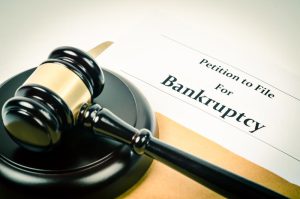If your business is in serious trouble, filing for bankruptcy is one of the most consequential decisions you can make. Many business owners and entrepreneurs feel overwhelmed by the prospect of filing for bankruptcy. Furthermore, they may worry that doing so will automatically make it impossible for their company to stay in business.
While these concerns are understandable, it is important to remember that not all types of bankruptcy are alike. Understanding what each form of bankruptcy means for your business is crucial to know how to devise a plan to protect your assets and your company.
What Is Business Bankruptcy?
 Sometimes, businesses cannot pay their bills and have no way of taking on more debt to settle their accounts. When this occurs, the business is no longer solvent. Bankruptcy is a process that provides businesses with a means of dealing with their insolvency, allowing their owners an opportunity for a fresh start.
Sometimes, businesses cannot pay their bills and have no way of taking on more debt to settle their accounts. When this occurs, the business is no longer solvent. Bankruptcy is a process that provides businesses with a means of dealing with their insolvency, allowing their owners an opportunity for a fresh start.
The precise reason a business owner has for filing for bankruptcy will vary from situation to situation. For example, the business’s insolvency may be due to cash flow issues or due to its balance sheet. A knowledgeable bankruptcy lawyer can assess your business’s financial situation and help you determine whether filing for bankruptcy is right for you.
Depending on the circumstances, you might be eligible to file for one of three types of bankruptcy. Each type has benefits and drawbacks, as well as implications for whether your business can continue operating.
Chapter 7 Bankruptcy
Chapter 7 is a type of bankruptcy in which a court-appointed trustee sells your assets and uses the proceeds of the sale to pay creditors on your behalf. With Chapter 7, your ability to continue operating the business will depend on its structure.
If your business is its own legal entity, such as an LLC or corporation, Chapter 7 serves as a means of liquidating the structure of your company. It will not be able to continue its operations in its current form.
However, if your business is a sole proprietorship, Chapter 7 bankruptcy might allow you to keep your business operational. An experienced business bankruptcy attorney can advise whether Chapter 7 may allow your sole proprietorship to continue doing business.
Chapter 13 Bankruptcy
Chapter 13 is a form of bankruptcy available only to individuals or sole proprietorships. In this type of bankruptcy, you can maintain your assets as you repay your creditors via a repayment plan. Your business can continue to operate under this form of bankruptcy.
You should keep in mind that qualifying for Chapter 13 bankruptcy means that you need to meet some specific requirements. In particular, this form of bankruptcy is subject to certain debt limits. However, a knowledgeable bankruptcy lawyer can advise you on certain strategies that might be available to you to get your debts below the limits before filing.
Chapter 11 Bankruptcy
Chapter 11 is a reorganization process that, like Chapter 7, is overseen by a trustee. However, rather than liquidating your business, Chapter 11 keeps your business alive and pays your creditors over time.
Filing for Chapter 11 bankruptcy is complex and involves a lot of work. However, it is the only bankruptcy option that will allow your business to continue to operate if you have a partnership, LLC, or corporation.
Furthermore, if you are a sole proprietor who wants to restructure and stay in business, Chapter 11 may also be an option for you if you have too much business debt to be eligible for Chapter 13.
Contact an Experienced Raleigh Bankruptcy Lawyer Today
There are many reasons a business can run into financial trouble. As a business owner, you might worry that filing for bankruptcy is equivalent to saying you are giving up on your company. However, there are many cases in which filing for bankruptcy is the only way your business might have an opportunity to continue operating.
If you are wondering whether bankruptcy might be a good option to preserve your business, contact the experienced Raleigh business bankruptcy lawyer of Bradford Law Offices. Our seasoned attorney has helped businesses across North Carolina take legal action to protect their interests, and we are ready to help you do the same. You can count on us to do everything we can to ensure you have a chance at a financially successful future. Contact us online or call us today at (919) 758-8879 for a confidential consultation and find out what your options are.